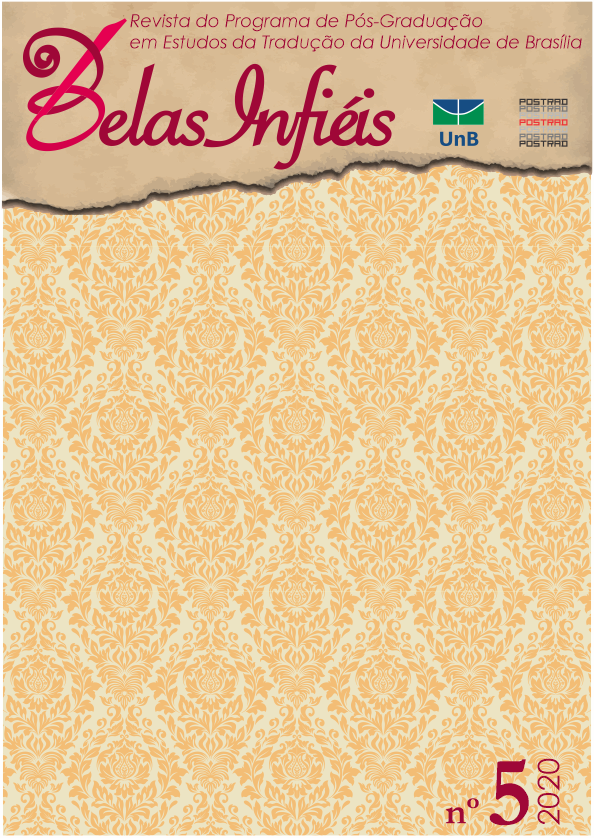Viajando pelas emoções: encenando o erótico
DOI:
https://doi.org/10.26512/belasinfieis.v9.n5.2020.29635Palavras-chave:
Corporificação. Encontro. Conexão. Resposta Emocional. Sensualidade. Performance.Resumo
Este artigo discute a tradução para a performance como um esforço humanista impulsionado pelo desejo de conexão com a alteridade. A partir das ideias de Gabriel Marcel, Georges Bataille e Slavoj Žižek, entre outros, ele descreve a tradução teatral nos termos de uma nostalgia pelo humano ausente, como uma prática preocupada em recuperar a conexão perdida, uma continuação do ser que vai além dos limites e restrições do racional. Nesse sentido, argumenta que há algo comum à promessa mantida pela tradução e pela experiência erótica. Em última análise, talvez o que acenda essa promessa seja o contraste com a posse de si mesmo, o antídoto para nosso modo descontínuo de existência como indivíduos definidos e separados.
Downloads
Referências
Textos do Corpus
GARCÃA LORCA, Federico. Five Plays. Traduzido por: James Graham-Luján e Richard L. O’Connell. Harmondsworth: Penguin, 1965.
GARCÃA LORCA, Federico. Obras completas. Madri: Aguilar, 1980.
GARCÃA LORCA, Federico. Blood Wedding. Traduzido por: David Johnston. Sevenoaks: Hodder & Stoughton, 1988. Tradução de: Bodas de Sangre.
GARCÃA LORCA, Federico. In Search of Duende. Traduzido por: Christopher Maurer. Nova Iorque: New Directions, 1998.
GARCÃA LORCA, Federico. Play and Theory of the Duende. Traduzido por: A. S. Kline. Disponível em: http://www.poetryintranslation.com/PITBR/Spanish/LorcaDuende.htm. 2007a. Acesso em: 12 jul. 2016. Tradução de: Juego y Teoría del Duende.
GARCÃA LORCA, Federico. Blood Wedding. Traduzido por: A. S. Kline. Disponível em: http://www.poetryintranslation.com/PITBR/Spanish/BloodWeddingActI.htm. 2007b. Acesso em: 12 jul. 2016. Tradução de: Bodas de Sangre.
GARCÃA LORCA, Federico. Four Major Plays. Traduzido por: John Edmunds. Oxford: Oxford World Classics, 2009.
DE MOLINA, Tirso. The Lady Killer of Seville and His Graven Guest. Traduzido por: Michael Kidd. Disponível em: http://www.outofthewings.org/db/play/el-burlador-de-sevilla/translations#tr226. 2004. Acesso em: 12 jul. 2016. Tradução de: El burlador de Sevilla y convidado de piedra.
Obras Citadas
AGAMBEN, Giorgio. Homo Sacer: Sovreign Power and Bare Life. Traduzido por: Daniel Heller-Roazen. Londres: Meridian, 1998. Tradução de: Homo sacer: Il potere sovrano e la nuda vita.
BARTHES, Roland. The Pleasure of the Text. Traduzido por: Richard Miller. Nova Iorque: Hill and Wang, 1975. Tradução de: Le plaisir du texte.
BATAILLE, Georges. Death and Sensuality. A Study of Eroticism and the Taboo. Traduzido por: Mary Dalwood. Nova Iorque: Walker and Company, 1962.
BENJAMIN, Walter. The Work of Art in the Age of Mechanical Reproduction. In: ARENDT, Hannah (ed.). Illuminations. Trans. Harry Zohn. New York: Schocken Books, 1969. p. 211-244.
BENTLEY, Eric. The Life of the Drama. Nova Iorque: Atheneum, 1964.
BERMAN, Antoine. Translation and the Trials of the Foreign. Trans. Lawrence Venuti. In: VENUTI, Lawrence (ed.). The Translation Studies Reader. London: Routledge, 2000. p. 276-289.
EAGLETON, Terry. Literary Theory. An Introduction. Oxford: Blackwell, 1983.
FAUCONNIER, Giles; TURNER, Mark. The Way we Think: Conceptual Blending and the Mind’s Complexities. Nova Iorque: Basic Books, 2002.
FREUD, Sigmund. The Uncanny. In: STRACHEY, James (ed.). The Standard Edition of the Complete Psychological Works, Vol. XVII. Londres: Hogarth Press, 1955. p.219-252.
HANSSEN, Beatrice (ed.). Walter Benjamin and the Arcades Project. Londres: Continuum, 2006.
HARE, David. Writing Left Handed. Londres: Faber, 1991.
JOHNSTON, David. Translating the Theatre of the Spanish Golden Age. A Story of Chance and Transformation. Londres: Oberon, 2015.
KELLY, Stephen. Introduction. In: JOHNSTON, David; KELLY, Stephen (eds.). Betwixt and Between: Place and Cultural Translation. Newcastle-upon-Tyne: Cambridge Scholars, 2007.
MARCEL, Gabriel. Journal Métaphysique. Paris: Gallimard, 1928.
MARCEL, Gabriel. Creative Fidelity. Traduzido por: Robert Rosthal. Nova Iorque: Fordham University Press, 2002.
MARCUSE, Herbert. One-Dimensional Man. Studies in the Ideology of Advanced Industrial Society. Abingdon: Routledge & Kegan Paul, 1964.
MATICH, Olga. Erotic Utopia. The Decaddent Imagination in Russia’s Fin de Siècle. Madison: University of Wisconsin University Press, 2005.
MORRISON, John M. Lost in Translation: Why Have We Declared War on Foreign Dramatists. The Guardian, 1º set. 2010. Disponível em: http://www.theguardian.com/stage/theatreblog/2010/sep/01/lost-translation-war-foreign-dramatists. Acesso em: 6 set. 2020.
HARDWICK, Charles. Semiotic & Significs: The Correspondence Between Charles S. Peirce & Victoria Lady Welby. Bloomington: Indiana University Press, 1977.
RABINOWITZ, Peter J. Before Reading: Narrative Conventions and the Politics of Interpretation. Ohio: Ohio State University Press, 1987.
SPENCE, E. F. Our Stage and its Critics. 1910. Disponível em: http://www.gutenberg.org/files/13408/13408-h/13408-h.htm.
STATES, Bert O. Great Reckonings in Little Rooms: On the Phenomenology of Theater. Berkeley: University of California Press, 1975.
TURNER, Victor. Betwixt and Between: The Liminal Period in Rites de Passage. In: TURNER, Victor. The Forest of Symbols: Aspects of Ndembu Ritual. Ithaca: Cornell University Press, 1967. p. 93-111.
VALERY, Paul. Poésie et pensée abstraite. In: NEMIROVSKY, Irene. Oeuvres, Tome 1. Paris: Pléiade, 1957.
YEATS, W. B. The Collected Poems of W. B. Yeats. Ware: Wordsworth Editions, 1994.
ZITO, Angela. Body. Material Religion: The Journal of Objects, Art and Belief, v. 7, n. 1, p. 15-25, 2011.
ZIZEK, Slavoj. Enjoy Your Symptom. Jacques Lacan in Hollywood and Out. Londres: Routledge, 1992.
Downloads
Publicado
Como Citar
Edição
Seção
Licença
Copyright (c) 2020 CC BY

Este trabalho está licenciado sob uma licença Creative Commons Attribution 4.0 International License.
Dado ao acesso público desta revista, os textos são de uso gratuito, com obrigatoriedade de reconhecimento da autoria original e da publicação inicial nesta revista
A revista permitirá o uso dos trabalhos publicados para fins não comerciais, incluindo direito de enviar o trabalho para bases de dados de acesso público. As contribuições publicadas são de total e exclusiva responsabilidade dos autores.
Os autores, ao submeterem trabalhos para serem avaliados pela revista Belas Infiéis, mantêm os direitos autorais e concedem à revista o direito de primeira publicação, sendo o trabalho licenciado sob a Creative Commons Attribution License Atribuição 4.0 Internacional (CC BY 4.0).



















